An application has been made in Guelph for a safe supply site, which would provide prescription opioids to people living with addictions. Guelph did not make the first round of funding but local leaders are pushing to make it a reality.
Last week, two new safe supply sites were announced for Toronto to assist drug users in obtaining legal prescription versions of opioids that are safer than the toxic supply currently found on the streets.
“Safe supply programs ensure that eligible participants receive prescribed opioids at a level that is managed by a physician or nurse practitioner,” said Melissa Kwiatkowski, director of primary care at the Guelph Community Health Centre, which was among the partner agencies that applied for the program in the fall.
Kwiatkowski said CHC and its parteners have been pursuing a safe supply site in Guelph for about a year.
The goal is to reduce the symptoms of withdrawal and to reduce reliance on the toxic street supply of opioids. If approved, the safe supply site would work in conjunction with the Consumption and Treatment Site, said Kwiatkowski.
"Addiction is a chronic health condition and I think, just like programs for diabetes and heart disease, we invest in programs across the continuum of services so we invest in prevention programs and acute treatment programs and management programs and addiction is just the same," she said.
Between Jan. 1 and Aug. 19 there has been a total of 15 overdose deaths in Guelph. In comparison, that’s 36 per cent more deaths by overdose than the 11 reported in Guelph due to COVID-19 and more than double the number reported in 2019.
The rate of deaths due to overdose in Guelph is trailing that of Toronto, but only slightly. Kwiatkowski said data from the coroner’s office show a rate of death by overdose at 4.89 per 100,000, compared to Toronto’s rate of 6.07 per 100,000.
“I think it’s important to know how we compare but at the end of the day 15 deaths in eight months is completely unacceptable and our community should be outraged by this," said Kwiatkowski.
The opioid and COVID-19 crises are playing out concurrently in Guelph, said Kwiatkowski and she suggests that is having a negative effect on the number of overdose deaths in the city.
“Last year in total, for the entire year, we saw only seven overdose deaths, so the numbers have significantly increased this year,” said Kwiatkowski.
Adrienne Crowder, manager of the Wellington Guelph Drug Strategy, said it is difficult to watch the way in which governments and the public have mobilized in the wake of COVID-19, while the opioid crisis has been allowed to go on for years relatively unchecked.
“It’s very difficult to watch the absence of action around the overdoses because you can see when there is public support for it and an understanding of what needs to be done, how quickly things can move,” said Crowder. “I find it very difficult knowing how we can carry on day after day putting people at this risk.”
Recently, the Wellington Guelph Drug Strategy joined other drug strategies in the province in writing a joint letter to the provincial and federal health ministers asking for better access to safe supplies of prescription opioids as an alternative to the toxic supply currently found on the streets.
“We need it,” said Crowder. “The quality and the content of what is in the drug supply at street level is very toxic and unknown from day to day.”
The COVID-19 pandemic has negatively affected all health services, said Crowder, which in turn is negatively affecting those affected by the opioid crisis. She said that, combined with an unsafe supply and the stigma attached to drug use has proven deadly.
“How can we say these lives are important lives to our community and it’s not okay to lose them?”
Kwiatkowski said the CHC and its partners are continuing to advocate for a safe supply site in Guelph.
“We are really hopeful that the numbers as they stand today really speak for themselves and that we might be considered for this program through Health Canada,” she said.
